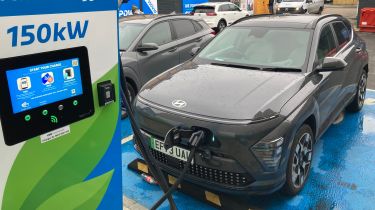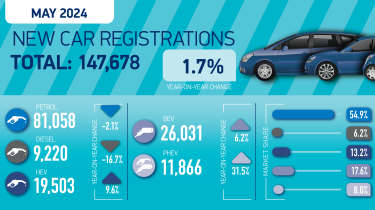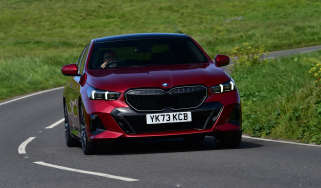Big electric car discounts are “unsustainable” as private sales fall again
The car industry pushes for VAT reductions on EV sales and charging after the general election, to help meet ZEV Mandate requirements

UK car registration figures for May offer a glint of hope for manufacturers struggling to convince private buyers to make the transition to electric vehicles - EV sales in the retail sector only dropped by two per cent compared to May last year, while the retail sector overall fell 12.9 per cent.
Total registrations for the month were just ahead of May 2023’s figures, with a small 1.7 per cent year-on-year increase fuelled by continued activity in the fleet sector. A total of 147,678 new cars hit the road in May, the strongest figure for the month since 2021. However, that's still 19.6 per cent lower than the registration total in May 2019 before the pandemic struck.
According to the Society of Motor Manufacturers and Traders, fleet and business registrations rose 14 per cent and 9.5 per cent respectively last month, which was enough to just offset the decline in private registrations. It says that while deliveries of petrol and diesel cars fell back, registrations of ‘electrified’ cars rose with plug-in hybrids (PHEVs) up 31.5 per cent to take an 8 per cent share of the market. Other hybrids rose 9.6 per cent.

Overall, thanks to continued fleet and business demand, fully electric cars outperformed the market, with registrations up 6.2 per cent giving EVs a 17.6 per cent market share. The SMMT points out that the performance is “encouraging, but still below the trajectory mandated on manufacturers by its Vehicle Emissions Trading Scheme, which demands 22 per cent of new vehicles sold this year must be zero emission”.
There are more than 100 different EV models on the UK market currently, but manufacturers are being forced to resort to heavy discounting to drive demand from private buyers - a situation the industry body says is unsustainable. According to the SMMT, manufacturer discounts “cannot be sustained indefinitely as it undermine the ability of companies to invest in next generation technologies”. It wants the next government to temporarily cut VAT on EV purchases by 50 per cent, and reduce the VAT levy on public charging from 20 to 5 per cent, which is the rate levied on EV drivers charging via their domestic electricity supply.
“As Britain prepares for next month’s general election, the new car market continues to hold steady as large fleets sustain growth, offsetting weakened private retail demand,” says SMMT chief exec Mike Hawes. “Consumers enjoy a plethora of new electric models and some very attractive offers, but manufacturers can’t sustain this scale of support on their own indefinitely. Their success so far should be a signpost for the next government that a faster and fairer transition requires carrots, not just sticks.”
Which models are buyers snapping up? These are the UK's best-selling cars....






